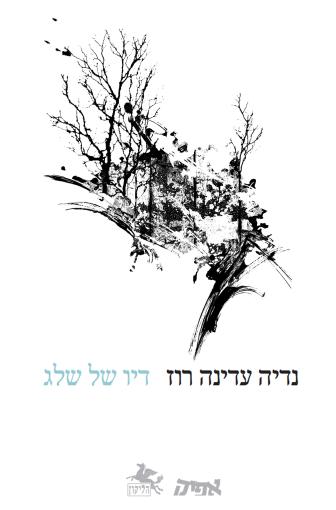Article
Review: a poet who knows her snow

November 29, 2018
With poetic restraint Rose scatters her biography throughout: a new home and a new landscape, the experience of being uprooted, loss, death. This debut book, edited by Dror Burstein, contains about 80 poems and is dedicated to her sister, Hannah Anya Bondar, who was killed in a terror attack in Jerusalem in 2004.
In Inheritance Rose writes:
I didn’t know how to cook.
My older sister left me
the birthright just like that,
she went.
Her children came to live with us,
the pot widened.
Its handles became farther from each other
and my sister from me.
The potatoes in it grew heavy.
The faucet bent its head
over the kitchen sink
like a horse hitched to the house-cart. [Tr. Linda Zisquit]
The loss of her sister is not the only one depicted in the book. The death of her father and a slow parting from her mother, who was losing her memory, are also striking. If Bondar’s death was sudden and unexpected, that of her mother, following close on her father’s, was long and drawn out.
The power of Rose’s poems, some of which leave the reader open-mouthed, is expressed in the marvelous way she manages to fill the emptiness that has been created. Or, perhaps she does not fill the void, but rather it fills her. Rose does not drag readers into her pain, but shares it with them, along with consolation and reconciliation. In this way loss and absence turn into the possession of something innocent and hopeful.
So with bare hands
I held onto happiness
unable to explain
why it was good. [Tr. Irit Sela]
Home with its furniture and objects provides the central axis for Rose’s poetry. She lists them: a broom, a wall, a closet, scrub brushes, refrigerator, cooking pot and so on. They all have a place in her work. In one poem she describes with great flair a bed that stands on its hind legs like a horse. [….] Doors and windows, mediating between the home and outdoors, make frequent appearances.
Windows provide a glance, and poetry is always a furtive glance, from the outside in and from the inside out. This moving collection allows the reader to look at a kind of magic from all possible angles, to be part of the play of light and shade and changing seasons: day, night, summer, autumn, winter and the whiteness of snow.
Rose is a minimalist […] and the book ends with a poem of a single line. Three words and a question mark, to be precise.
Before I opened the poetry collection, Snow Ink, I wondered about its curious and tempting title. White on white? Writing on ice or water? Perhaps the intention was to write a poem and disappear without a trace. The poems in the book provide a partial answer, as in these lines: “Trees dip into the white ink of snow/ the branches’ signature as yet uncertain.”
The poet, born in Moscow, knows her snow and whiteness. It seems that she brought a few kilos of it with her in a suitcase when she came to Israel. Snow sneaks into her poems in various ways: a ball, a doll, and mostly as flakes. Yet in other poems the reader learns that Rose's childhood has not been frozen and neither has time. The past simply takes up a large space in the present: “I press ‘Back’ and switch to Russian/ filling memory cards/ with snow/ print my footsteps/ on a page.”With poetic restraint Rose scatters her biography throughout: a new home and a new landscape, the experience of being uprooted, loss, death. This debut book, edited by Dror Burstein, contains about 80 poems and is dedicated to her sister, Hannah Anya Bondar, who was killed in a terror attack in Jerusalem in 2004.
In Inheritance Rose writes:
I didn’t know how to cook.
My older sister left me
the birthright just like that,
she went.
Her children came to live with us,
the pot widened.
Its handles became farther from each other
and my sister from me.
The potatoes in it grew heavy.
The faucet bent its head
over the kitchen sink
like a horse hitched to the house-cart. [Tr. Linda Zisquit]
The loss of her sister is not the only one depicted in the book. The death of her father and a slow parting from her mother, who was losing her memory, are also striking. If Bondar’s death was sudden and unexpected, that of her mother, following close on her father’s, was long and drawn out.
The power of Rose’s poems, some of which leave the reader open-mouthed, is expressed in the marvelous way she manages to fill the emptiness that has been created. Or, perhaps she does not fill the void, but rather it fills her. Rose does not drag readers into her pain, but shares it with them, along with consolation and reconciliation. In this way loss and absence turn into the possession of something innocent and hopeful.
So with bare hands
I held onto happiness
unable to explain
why it was good. [Tr. Irit Sela]
Home with its furniture and objects provides the central axis for Rose’s poetry. She lists them: a broom, a wall, a closet, scrub brushes, refrigerator, cooking pot and so on. They all have a place in her work. In one poem she describes with great flair a bed that stands on its hind legs like a horse. [….] Doors and windows, mediating between the home and outdoors, make frequent appearances.
Windows provide a glance, and poetry is always a furtive glance, from the outside in and from the inside out. This moving collection allows the reader to look at a kind of magic from all possible angles, to be part of the play of light and shade and changing seasons: day, night, summer, autumn, winter and the whiteness of snow.
Rose is a minimalist […] and the book ends with a poem of a single line. Three words and a question mark, to be precise.
© Shlomit Cohen-Asif
Translator: Lisa Katz
Source: Excerpted from Haaretz 20.12.2015
Sponsors





Partners
LantarenVenster – Verhalenhuis Belvédère

